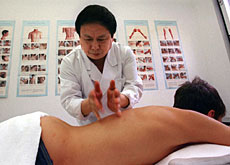Alternative medicine catches a cold

Patients who prefer homeopathy and other alternative therapies to traditional forms of medicine may in future have to foot the bill for these treatments.
Interior Minister Pascal Couchepin, who has the health portfolio, announced on Friday that five types of complementary medicine would no longer be covered by basic health insurance.
The interior ministry said the five therapies failed to meet the criteria on efficacy, suitability and cost-effectiveness laid down in Switzerland’s health-insurance law.
The ministry stressed, however, that the decision should not be seen as a ruling on the merits of complementary medicine.
Health insurers can stop paying for the treatments from the end of the month.
The Union of Associations of Swiss Physicians for Complementary Medicine said the decision by the interior ministry was a mistake.
“It ignores what people really want and will lead to a health system only rich patients can afford,” it said in a statement.
Angry reaction
The Swiss Patients’ Organisation said it was disappointed because the ministry’s decision did not correspond with the findings of a report into complementary medicine.
Patients had to bear the brunt of the costs, criticised the president of the country’s main consumer organisation.
The main Swiss doctors’ association described Couchepin’s announcement as counterproductive, while health insurers said they welcomed it.
Alternative therapies are very popular in Switzerland. According to a recent survey, one-third of the population has consulted a doctor specialising in complementary medicine at least once.
In 1999 the interior ministry ruled that five therapies – homeopathy, herbal medicine, neural therapy, traditional Chinese medicine and anthroposophic medicine – should be covered provisionally by basic health insurance.
The scheme, which ran for a trial period of five years, was aimed at assessing the potential of these therapies.
SFr7-million study
Friday’s decision pre-empts a SFr7 million ($5.6 million) study on complementary medicine which is due to be published this year.
This was commissioned to assess whether the five therapies met the criteria on efficacy, suitability and cost-effectiveness.
The study, which has been described by experts as a world first, was also intended to build bridges between “scientific” and alternative forms of medicine.
But it has been beset by controversy. There have been problems over the methodology, communication and interpretation of the data, and parts of the analysis have yet to be completed.
In 2003 complementary medicine accounted for 0.2 per cent of health insurers’ costs.
Alternative
One alternative would have been to make these therapies subject to supplementary insurance policies.
But opponents doubt whether such a move would help to restrict costs.
Friday’s announcement is unlikely to mark the end of the matter. In the space of seven months, more than 120,000 people have signed a people’s initiative calling for a nationwide vote to enshrine the right to alternative therapies in the constitution.
According to opinion polls, four out of five Swiss think that complementary medicine should continue to be paid for under the basic health-insurance scheme.
This means that Couchepin’s decision could be overturned at the ballot box.
swissinfo
In Switzerland there are 270 doctors offering homeopathy.
Between 300 and 400 offer traditional Chinese medicine (acupuncture excluded).
There are 250 doctors specialising in herbal medicine.
106 doctors specialise in neural therapy.
150 offer anthroposophic medicine.
Since 1999 the basic health insurance scheme has paid for five alternative therapies provided by qualified doctors – homeopathy, herbal medicine, neural therapy, traditional Chinese medicine and anthroposophic medicine.
The decision will not affect acupuncture which, though part of traditional Chinese medicine, will continue to be covered.

In compliance with the JTI standards
More: SWI swissinfo.ch certified by the Journalism Trust Initiative

You can find an overview of ongoing debates with our journalists here. Please join us!
If you want to start a conversation about a topic raised in this article or want to report factual errors, email us at english@swissinfo.ch.